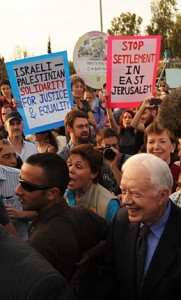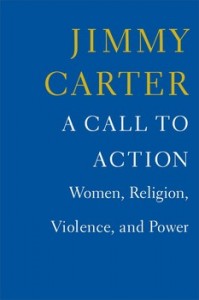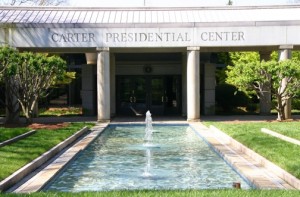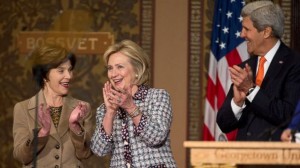Carter as Kristof: How Jimmy Carter’s New Book Takes a Page Out of Nick Kristof’s Savior Narrative
By Sayantani DasGupta
 Jimmy Carter is undoubtedly a good man with good intentions. He was, in fact, one of my first heroes. He was the first president I ‘voted’ for in my elementary school mock presidential elections (and that while living in a red state). His work after the presidency, including building houses for the homeless and joining, with other world leaders, Nelson Mandela’s “The Elders,” has been nothing short of inspirational in its dignity and humility. A deeply religious man who is simultaneously able to stand by his social justice principles, Carter’s character is best revealed by his decision to leave his church of seventy years, the Southern Baptist Convention, due to its refusal to allow women to become pastors, deacons, or teachers in seminaries. Yet, sometimes, the actions of even good people with good intentions can have bad (or unintended) consequences.
Jimmy Carter is undoubtedly a good man with good intentions. He was, in fact, one of my first heroes. He was the first president I ‘voted’ for in my elementary school mock presidential elections (and that while living in a red state). His work after the presidency, including building houses for the homeless and joining, with other world leaders, Nelson Mandela’s “The Elders,” has been nothing short of inspirational in its dignity and humility. A deeply religious man who is simultaneously able to stand by his social justice principles, Carter’s character is best revealed by his decision to leave his church of seventy years, the Southern Baptist Convention, due to its refusal to allow women to become pastors, deacons, or teachers in seminaries. Yet, sometimes, the actions of even good people with good intentions can have bad (or unintended) consequences.
As a lifelong feminist, a daughter of immigrants, and an academic whose work is concerned with narrative, health, and social justice, I am quite leery of this country’s fascination with ‘saving’ girls and women of the Global South. It is a narrative that not only frames a certain category of women as perpetually victimized, and certain countries as incapable of or unwilling to care for their own people, but is often used to justify neocolonial attitudes and military action. Which is why I was dismayed when I heard about Jimmy Carter’s new book, A Call to Action: Women, Religion, Violence and Power. (Et tu, mon former President? I wanted to cry.)
Carter, Kristof and White Savior-dom
Admittedly, Carter’s treatise on global gender injustice doesn’t follow what I have elsewhere called the “your women are oppressed, but ours are awesome” narrative, which symbolically pits (awesome, liberated, empowered!) women from the Global North against (downtrodden, voiceless, oppressed) women from the Global South. That is, Carter pays attention to issues of gender oppression in the Global North (sexual assault in the military, this country’s epidemic of campus rapes) and the Global South (female genital cutting, female infanticide). In addition, he seems well aware of the dangers of the white savior narrative; in interviews, he has been articulate about the fact that Westerners cannot swoop into African or Asian countries and dictate policy. In his words,
…if we westerners – no matter how well we are received – if we go in to a remote village in Africa and so forth and we begin to preach to them that ,’you need to stop circumcising your girls’, ‘you need to stop letting your little girls who are ten years be married’, and so forth – it’s counterproductive…that’s why we have been so careful in this book and at The Carter Center to utilize women who come from those regions, and to let them make their own recommendations…We don’t want our folks to go in there and tell them how to run their business.
Unfortunately, A Call to Action still falls into the tradition of ‘save the global girls and women’ books like New York Times reporter Nicholas Kristof and wife Sheryl WuDunn’s Half the Sky: Turning Oppression into Opportunity for Women Worldwide. (If you’re unfamiliar with critiques of Kristof’s work — from how he makes himself a self-congratulatory protagonist in his stories to how his reports on Asian sex work or African genital cutting don’t help his readers act, but rather gawk at voyeuristic spectacles of global ‘oppression porn’– see this post entitled “Nicholas Kristof: Half the Sky, All the Credit” which provides some great links.)
 On the one hand, A Call to Action begins by chronicling Carter’s youth growing up in the racially divided Deep South, making a parallel between white people who “remained relatively quiet and enjoyed the benefits of the prevailing system” (1) and men who similarly enjoy the benefits of gender inequity. The first half of the book is well written and memoir-like, with Carter drawing out lessons regarding race and gender oppression from his own life experiences, pre-, during, and post-presidency. Yet, A Call to Action eventually gets to the same sort of ‘survey of global gender oppressions’ as Half the Sky, devoting a few pages each to the ‘greatest hits’ of worldwide violence against women, including honor killings, infanticide, genital cutting, child marriage, dowry death, and sexual trafficking. This near schizophrenic switch in tone happens about half-way through the book, when Carter describes reading Half the Sky, which he calls “a remarkable book.” In a chapter called “Learning from Human Rights Heroes,” Carter praises Kristof: “Nick has traveled with us at times to observe the Center’s efforts to promote peace and freedom and to control the many diseases that take their heaviest toll among woman and children. He and Sheryl have done as much to promote women’s rights as anyone I know” (95). (Really? Done more for women than feminist activists like Gloria Steinem, Vandana Shiva or bell hooks? Really?)
On the one hand, A Call to Action begins by chronicling Carter’s youth growing up in the racially divided Deep South, making a parallel between white people who “remained relatively quiet and enjoyed the benefits of the prevailing system” (1) and men who similarly enjoy the benefits of gender inequity. The first half of the book is well written and memoir-like, with Carter drawing out lessons regarding race and gender oppression from his own life experiences, pre-, during, and post-presidency. Yet, A Call to Action eventually gets to the same sort of ‘survey of global gender oppressions’ as Half the Sky, devoting a few pages each to the ‘greatest hits’ of worldwide violence against women, including honor killings, infanticide, genital cutting, child marriage, dowry death, and sexual trafficking. This near schizophrenic switch in tone happens about half-way through the book, when Carter describes reading Half the Sky, which he calls “a remarkable book.” In a chapter called “Learning from Human Rights Heroes,” Carter praises Kristof: “Nick has traveled with us at times to observe the Center’s efforts to promote peace and freedom and to control the many diseases that take their heaviest toll among woman and children. He and Sheryl have done as much to promote women’s rights as anyone I know” (95). (Really? Done more for women than feminist activists like Gloria Steinem, Vandana Shiva or bell hooks? Really?)
War and Saving Women From ‘The Veil’
Despite Carter’s critique of all religious traditions for their treatment of girls and women, focusing extensively on patriarchal manipulation of Christian doctrine, it is inevitable that his book’s linking of ‘women, religion, and violence’ will speak to the deep-seeded Islamophobia that has been sown, grown, and harvested in this country in the years since 9-11. Central to this popular sentiment has been the notion that ‘Muslim culture’ is inherently more ‘oppressive’ to women, and that the religion of Islam is somehow more intrinsically supportive of violence.
Carter actually addresses head-on the idea that Islam is inherently any more oppressive to women, quoting Islamic scholars and Muslim feminists speaking about these issues. He writes with great humility, again barely skirting the dangers of ‘white saviorism.’ In his words, “It is difficult for me, as an American Christian, to understand how deprivation of women’s rights in Muslim countries can best be confronted and alleviated” (105).
Yet, A Call to Action cannot be considered outside of political context, but must be considered in dialogue with other, broader cultural narratives about women, religion and violence in our society today. The timing of its publication coincides (accidentally or purposefully) with the U.S. military’s apparent plan to withdraw from Afghanistan, and a renewed concern expressed by Washington and the mainstream media about the ‘plight’ of Afghan women. In the words of Hillary Clinton at a ‘rally for Afghan women’ (during which she was joined by Laura Bush and John Kerry), “…we are well aware this is a serious turning point for all the people of Afghanistan, but in particular the hard-fought gains that women and children have been able to enjoy.” In the same vein, a recent LA Times article, “A precarious time for Afghan women,” suggests that “Since the Taliban’s fall, women have seen fitful gains. But those with access to education and work fear the U.S. troop departure will erode their freedoms.” (In contrast to these paternalistic voices of concern, consider the words of Bahar Azizi of rawa.org – the revolutionary association of the women of Afghanistan – who says, “As an Afghan woman, I find the propaganda line used by the Yankees and the Brits that they must stay in Afghanistan to ‘protect the wimmins’ to be particularly breathtaking in its pathological audacity. We know they’re really there for the oil and gas pipelines, the rare earth minerals and the opium, so please, spare us this BS!”)
This justification of the wars in Afghanistan and Iraq as a means to ‘rescue’ oppressed Muslim women ‘from the veil’ is consistent with what post-colonialist theorist Gayatri Chakravorty Spivak has called “white men rescuing brown women from brown men,” whereby this trope of “rescuing women” becomes a justification for colonial aggression but ultimately the voices of the “brown women” are rendered utterly silent. This framing makes invisible any activism by women in securing their own liberation; rather, they are envisioned to be perpetual victims in need of external saving.
Any critiques of colonial aggression become near impossible, as war itself is sugar-coated in what has been called a ‘colonial feminism’; understood as a means to ‘free’ foreign ‘womenandchildren.’ As anthropologist Lila Abu-Lughod has suggested in her now classic essay, “Do Muslim Women Really Need Saving?”(see her 2013 book of the same title from Harvard University Press), the impetus to ‘save’ Afghan or Iraqi women is tied to the post-9/11 U.S. and European obsession with ‘The Muslim Woman’ as a figure representing religious and cultural, as opposed to political or historical, explanations of terrorism.
Where, then, does A Call to Action fall in this rhetoric that uses the ‘saving’ of girls and women to justify war? Former President Carter speaks out forcefully against our “excessive commitment to violence in this country.” As a lifelong peace activist, he critiques the multifold manifestations of violence in the U.S., including the death penalty, our culture of mass incarceration, and America’s history of being “involved in more wars, on a bilateral basis, since the United Nations was formed than any other country by far.” The chapters of A Call to Action on violence and incarceration are particularly breathtaking in their boldness.
Carter draws connections between our global cultures of violence and the oppression of women. In fact, he clearly articulates the impossibility of the U.S. having any sort of commitment to human rights if “we remain entangled in permanent global warfare.” He describes his public opposition to the war in Iraq, as well as the use of drone strikes by the U.S. military. Yet, he does so by invoking that same old ‘save the womenandchildren’ rhetoric: “International bombing raids and missile attacks on cities engender casualties involving many women, children and elderly… in addition, there has always been ancillary abuse [during war], especially of women.” (If drone strikes are wrong, they are wrong for hurting and killing people regardless of gender. Yet, women and girls are perpetually framed as – to borrow a horrible phrase from the AIDS epidemic – “innocent victims” as if their husbands, brothers, fathers, and sons are somehow more “guilty” simply based on their gender.)
Although the book critiques U.S. cultures of violence as being inextricable from global oppression of women and girls, ironically its invocation of ‘saving women and girls’ serves the very colonial aggression Carter so eloquently denounces. As discussed above, his book’s very “call to action” is consistent with the tradition of invoking ‘women’s oppression’ to justify global violence. And so, it might in fact be (willingly or unwillingly) part of what Teju Cole has called the white savior industrial complex, an institutionalized colonialism that pits the Global North in the position of always ‘saving’ the Global South, which is incapable of ‘saving’ itself.
Speaking For or Speaking With
There is a rhetorical violence inherent in ‘speaking for’ another group. The issue is about the locus of representation; in other words, ‘whose story is it?’ In any given narrative, who has the power to speak and who gets spoken for? Unfortunately, in narratives about global women’s oppression, it is very rarely women from the Global South themselves whose voices get heard (or get put in shiny gold letters on the covers of books). Instead, other, more powerful players speak about and for women rather than creating opportunities to speak with them.
As feminist philosopher Linda Martín Alcoff argues in her essay “The Problem Of Speaking For Others,” part of the problem is that none of us can transcend our social and cultural location: “The practice of privileged persons speaking for or on behalf of less privileged persons has actually resulted (in many cases) in increasing or reinforcing the oppression of the group spoken for,” she writes. Yet, she goes on to say, this doesn’t mean that people in privileged positions shouldn’t speak out against injustice. Rather, the effort must be made to create spaces to co-author, in other words, to speak with the Other whose injustice you are opposing.
 This framing can be called a position of solidarity rather than saving. This, I suggest, can be seen in Carter’s description of his Carter Center projects during which women leaders set the agendas and policies for their local environments. If any American politician would be open to ‘speaking with’ global women, it might be Carter. Yet his book, however thoughtful in its writing, may still unwittingly contribute to a far more problematic tradition in this country of ‘saving’ and in the process, ‘silencing’ girls and women in the Global South.
This framing can be called a position of solidarity rather than saving. This, I suggest, can be seen in Carter’s description of his Carter Center projects during which women leaders set the agendas and policies for their local environments. If any American politician would be open to ‘speaking with’ global women, it might be Carter. Yet his book, however thoughtful in its writing, may still unwittingly contribute to a far more problematic tradition in this country of ‘saving’ and in the process, ‘silencing’ girls and women in the Global South.
A Hijacked Narrative
How would we U.S. based feminists feel, say, if Desmond Tutu, Angela Merkel, or even Vladimir Putin were heard bemoaning the condition of American girls and women, speaking out against the sexualization of young girls in our mainstream media, our campus and military rape culture, our traditions of unequal pay for equal work? We who consider ourselves feminists, or progressive minded, might be furious, wondering why those world leaders were ignoring the long and rich tradition of activism in this country around those very issues. We might say those indignant leaders acted as if there were no Americans in the government, the private sector, or in our local communities, who cared about women’s issues at all. We might wonder why they were unable to hear our voices, which have so long been raised in protest toward our own liberation.
We might agree with poet Noor Shirazie who writes, “Call me oppressed,/but it is you who/suffers behind the/ bars of ignorance… Call me tyrannized,/but it is you who/stands as the tyrant/by shoving me under/such a false label.”
As men can and must speak about violence against women, so too must global leaders speak about problems that affect all of us in the human community. It is for these reasons that A Call to Action is a worthwhile read; but it must be read critically. For Carter’s book lacks a critique of the imbalance of power inherent in speaking for as opposed to speaking with; as well as a recognition of how his words may unintentionally support other, more oppressive, cultural narratives.
Gender oppression cannot be understood outside of race, colonialism, and other sociopolitical contexts. Due to its timing, and its resonance with broader cultural narratives about ‘saving’ foreign (particularly Muslim) women, the message of Jimmy Carter’s A Call to Action risks being hijacked, and used to help justify the very violence that its author so abhors.
_____________________________________
 Originally trained in pediatrics and public health, Sayantani DasGupta, MD MPH teaches at the Master’s Program in Narrative Medicine at Columbia University and the Graduate Program in Health Advocacy at Sarah Lawrence College. She is Co-chair of the Columbia University Seminar on Narrative, Health and Social Justice and a faculty fellow at Columbia’s Center for the Study of Social Difference. Sayantani is the co-author of a book of Bengali folktales, the author of a memoir about her time at Johns Hopkins Medical School, the co-editor of an award winning collection of women’s illness narratives, Stories of Illness and Healing: Women Write their Bodies, and co-editor of the recent collection Globalization and Transnational Surrogacy in India: Outsourcing Life. She is widely anthologized and published in venues including Ms., JAMA, Literary Mama, The Lancet, Dragon Ladies: Asian American Feminists Breathe Fire, and Fifty Shades of Feminism. Sayantani has been a TEDx speaker, and her online writing on gender, race, and embodiment can be found here at The Feminist Wire, as well as Racialicious, The Weeklings, Salon, Feministing, and Adios, Barbie. More about her work is at www.sayantanidasgupta.com
Originally trained in pediatrics and public health, Sayantani DasGupta, MD MPH teaches at the Master’s Program in Narrative Medicine at Columbia University and the Graduate Program in Health Advocacy at Sarah Lawrence College. She is Co-chair of the Columbia University Seminar on Narrative, Health and Social Justice and a faculty fellow at Columbia’s Center for the Study of Social Difference. Sayantani is the co-author of a book of Bengali folktales, the author of a memoir about her time at Johns Hopkins Medical School, the co-editor of an award winning collection of women’s illness narratives, Stories of Illness and Healing: Women Write their Bodies, and co-editor of the recent collection Globalization and Transnational Surrogacy in India: Outsourcing Life. She is widely anthologized and published in venues including Ms., JAMA, Literary Mama, The Lancet, Dragon Ladies: Asian American Feminists Breathe Fire, and Fifty Shades of Feminism. Sayantani has been a TEDx speaker, and her online writing on gender, race, and embodiment can be found here at The Feminist Wire, as well as Racialicious, The Weeklings, Salon, Feministing, and Adios, Barbie. More about her work is at www.sayantanidasgupta.com





Pingback: The Roundup for June 11th, 2014 | claim money trading